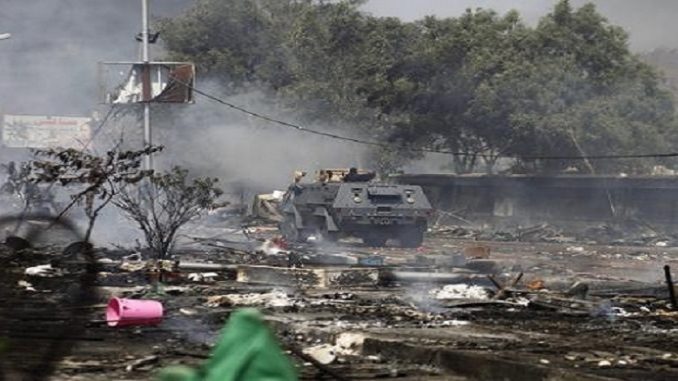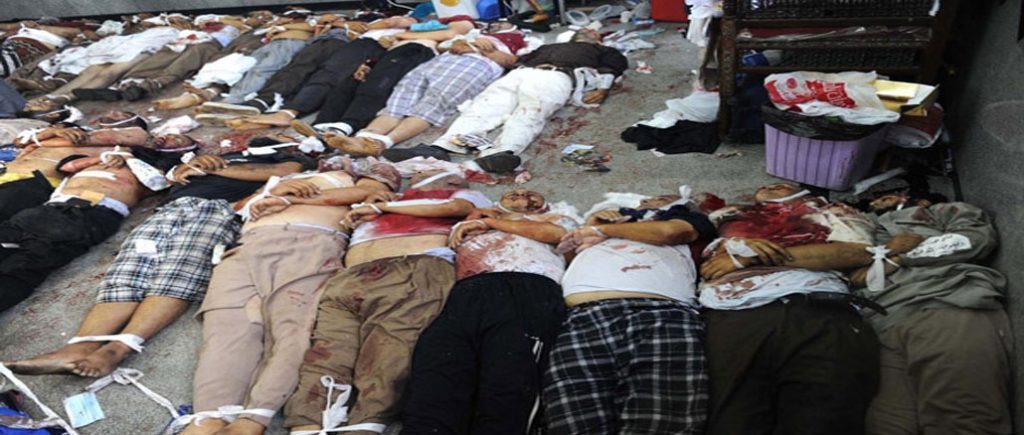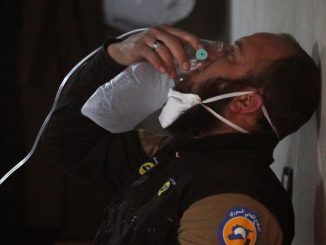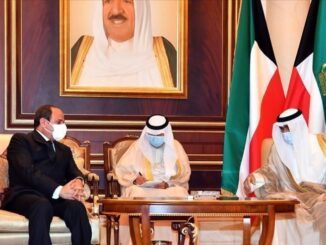
Contrary to what the producers of “The Choice 2” series had hoped for, the fifth episode of the series evoked memories for hundreds of activists about the truth of what happened in the dispersal of the Rabaa sit-in.
Activists and protesters who attended those difficult moments re-published documented historical testimonies about the truth of what happened.
The events of the forged series collide with the reality of what happened. The series, produced by the intelligence-owned company Synergy, hoped to produce and promote a fabricated story that justified what happened in the bloody operation to disperse the Rabaa square sit-in in August 2013. “Art is a mirror of peoples” is an ancient Arab and Egyptian proverb. But under the control of the Egyptian regime, art does not reflect what is going on in the street. Rather, it misleads the facts, belies reality, distorts history, and turns the truth into the void.

On Saturday, an episode was broadcast on the dispersal of the Rabaa and Al-Nahda sit-ins, which were opposing the coup led by Sisi, while he was in charge of the Ministry of Defence. The authorities claim that people at Rabaa Square were criminals and that they were armed and that suppressing it “was a meek and heroic act.” This viewpoint, which is promoted by the military and security authorities in the country, is totally denied by all international human rights organisations.
Local and international human rights organisations unanimously described what happened in Rabaa Square (east of Cairo) and Al-Nahda (west of Cairo) as a “massacre.” The organisations documented in numbers the hundreds of victims killed by the fire of the army and police forces. They asserted that the sit-in was “peaceful” and that protesters were not armed as the authorities promoted.
On August 14, 2013, the Egyptian army and police forces dispersed the sit-ins of supporters of Mohamed Morsi, the first elected civilian president, in the Rabaa Al-Adawiya and Al-Nahda squares. The dispersal resulted in hundreds of deaths. In the Rabaa massacre, the army opened fire on thousands of protesters, including women, children, and the elderly, killing and burning them. The sit-in was bustling, the dead mixed with the living, the bodies were burned, body parts were blown away, identities were lost, and hospitals and morgues were overwhelmed.
Human Rights Watch
Human Rights Watch has issued several reports regarding the massacre over recent years, the most prominent of which is the description of Rabaa dispersal as “the worst mass killing of protesters in Egypt’s modern history.” Egyptian authorities have not yet investigated truly what happened on August 14, 2013.
The human rights organisation accused the Egyptian security forces of planning “systematic mass killings.” The organisation, which relied on the investigations, said that killing at least 817 people by the security forces might amount to a “crime against humanity.” In one day near the Rabaa Al-Adawiya Mosque, 1,000 people might have been killed “perhaps the largest number of protesters were killed in a single day anywhere in the world in the modern era.” HRW blamed the security forces for not providing safe passages for those who want to leave the square before the sit-in dispersal. The authorities had previously promised that the dispersal would take place in stages, and the series promoted it.
The organisation stated that it has repeatedly called for an independent international investigation into the Rabaa massacre. It has called on the judicial authorities of other countries to investigate it and prosecute those responsible according to those countries’ national laws. It called for the prosecution to include horrific violations such as systematic torture and extrajudicial killing of protesters.
The organisation stressed that “no government official or security personnel have been investigated or prosecuted in Egypt for committing violations in Rabaa, and many survivors have been sentenced to death and lengthy prison terms in unfair trials.” “Without justice, the events of Rabaa remain a bleeding wound. Those responsible for the mass killings of protesters should not be secure forever from accountability.” In July 2018, Al-Sisi approved a law granting military commanders “immunity” from prosecution or interrogation regarding any event that occurred between July 3, 2013, and January 2016, except with permission from the Supreme Council of the Armed Forces. On the other hand, the organisation criticised the conviction of hundreds of demonstrators “on unfair charges in mass trials against the background of the protests.”
In July 2018, the department for “terrorism” crimes issued death sentences against 75 defendants in the Rabaa sit-in dispersal case, in which 713 defendants were tried. More than 650 people who participated in the sit-in were sentenced to prison terms of up to 25 years. Many of those who were released after spending seven years in prison are still facing harsh surveillance procedures that lead to depriving them of their freedom for 12 hours a day and severely affecting their lives, and restricting their freedom. Others who were sentenced in absentia are still in exile today.
Amnesty International
Amnesty International said that the dispersal of the Rabaa Al-Adawiya and Al-Nahda sit-ins marked “the beginning of a sharp decline in the human rights situation in Egypt.” It pointed out that, “after the massacre, human rights violations occurred at the hands of the Egyptian security forces, such as carrying out enforced disappearances and carrying out extrajudicial executions in a manner not seen before.”
The international organisation described the dispersal of the sit-in as “the darkest days in Egypt,” pointing out that “the massacre cast a shadow on Egyptian society, and it continues to this day.” It added, “Even though these years have passed, Egyptians are still living the nightmare of these horrific events.”
The organisation pointed out that “the failure to hold one member of the security forces or those who are responsible at the command level to account for the killings has fostered a climate of impunity and encouraged the security forces to carry out other operations.” According to Amnesty International, Al-Sisi’s regime is “determined to erase any memory of the dispersal.”
Human Rights Monitor
Human Rights Monitor said in a report that the Rabaa massacre is “a crime of the military and the media, depriving them of humanity.” It launched an attack on the Egyptian media, accusing it of “stripping away all human meaning.” It added: “He is not content with spreading rumours, but rather underestimates the number of the dead, and justifies their killing.”
The organisation said that the events that preceded the sit-in’s dispersal and the dispersal events in general left behind many individuals who were arrested and disappeared in secret places of detention. Neither their relatives nor their lawyers could reach them. The organisation sounded a threatening alarm about suspicions of the existence of secret graves in which some bodies were buried.
Eyewitnesses had informed some families about the death of their relatives during the sit-in dispersal. However, their bodies were not found. Their names are not registered to official statements or reports of human rights organisations. The families do not know their fate until now despite all legal measures taken.
International condemnations
It is noteworthy that the dispersal massacre was not monitored by human rights organisations only. Several countries condemned the massacre at the time or afterwards. These international statements indicate the condemnation of the Egyptian regime for killing its people. The United Nations condemned “the use of violence against demonstrators.” They held a closed session in the Security Council on the events, which considered it important to end the violence in Egypt.
The European Union also expressed its “deep concern” over “killing demonstrators,” noting that “violence will not lead to a solution” before affirming that “violence has made Egypt head towards an uncertain future.” In the United States, the White House “strongly” condemned the security forces’ violence against demonstrators in Egypt and criticised the declaration of a state of emergency.
The US President (at the time) Barack Obama delivered a speech on what happened. He said that “the United States strongly condemns the steps taken by the Egyptian government against civilians” and called on the authorities in Egypt to respect universal human rights, abolish the state of emergency, and start a comprehensive dialogue. The same thing happened in Germany, the United Kingdom, France, Italy, Russia, and China, and other countries such as Turkey, Iran, Tunisia, and Qatar.
Domestic condemnations
Likewise, the human rights condemnations of the massacre did not end globally. Rather, some local human rights organisations or Egyptian jurists condemned the massacre during the past years. One of those critics was Jamal Eid, the human rights defender, who described the massacre as a “crime against humanity.” He said that his position comes despite his standing against the Brotherhood and his presence on the other side of their policies and his fear of their rule of Egypt.
Researcher Ahmed Al-Attar expressed the same thing when he called for the fourth massacre to be considered a “crime of genocide at the international level,” pointing out that it is a “full-fledged massacre and its perpetrators must be held accountable internationally.”
Egyptian human rights organisations also issued a joint statement saying that “the crime of dispersing the fourth sit-in will not be subject to a statute of limitations, and its perpetrators will not go unpunished.” It also called for activating Article 15 of the Rome Convention and urged the International Criminal Court prosecutor to open an investigation.
They stressed that “the prosecution of the perpetrators of these crimes is not prevented by a lack of evidence or a lack of witnesses, but rather is the will of an international community in the first place. The prosecution of the perpetrators of these crimes and the pursuit of their trial will remain a shared responsibility of civil society, at the international and local levels, and an imperative and binding necessity.”
The article has published first at EgyptWatch.net



